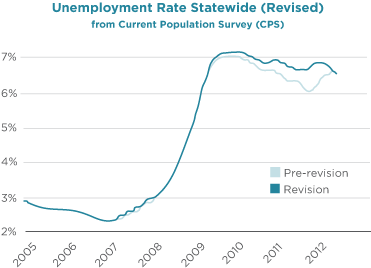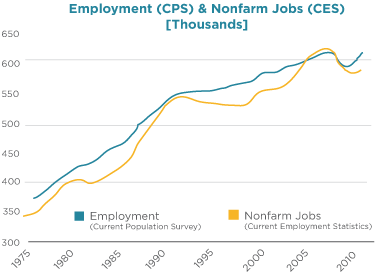According to the latest regional labor force data reported by the Bureau of Labor Statistics (BLS), the seasonally adjusted unemployment rate in Hawaii fell by 0.1% point to 6.5% in January 2012. However, the 0.1% drop was entirely the result of a 0.2% decline in the labor force. In fact, the employment level fell by 0.1%, and the state lost 1,700 jobs in January.


The monthly figures reported by the BLS are subject to sampling error because they are based on surveys that only cover subsets of the population. Labor force, employment, and the unemployment rate are based on a survey of households, and non-farm payroll employment is based on a survey of businesses and government agencies. Employment count in the two surveys differs because the payroll survey excludes agricultural, self-employed and household workers, but it counts multiple jobholders in each non-farm payroll job they hold; in the household survey multiple jobholders are only counted once.
To control for the sampling error, once a year the BLS incorporates population control adjustments into the household survey estimates, and benchmarks payroll estimates to full employment counts derived primarily from unemployment insurance tax records. The BLS announced these revisions for previous years along with the release of the January 2012 figures. For 2011, total nonfarm payrolls for the state of Hawaii were revised down by 2000 jobs, or 0.3%, but the overall number of employed individuals was revised up by 23,300, or 3.9%. The labor force was revised up by 27,500, or 4.3%, and the unemployment rate has been declining much slower from its 7.1% peak than previously estimated.
According to the revised figures the number of non-farm jobs grew by less than 1%, but employment grew by almost 2% in 2011. Given the small size of the agriculture sector, this divergence implies that there was a strong growth of self-employed and household workers. The two surveys tend to converge when individuals start taking on multiple jobs, which usually occurs as capacity utilization increases close to the peak of the business cycle.


There is a considerable variation in the magnitude of revisions across sectors. Employment Services that mostly consist of temporary jobs had a 4.8% upward revision, and with a 20% growth in 2011, the category surpassed its previous peak in 2006. After a 4.2% upward revision, Arts and Entertainment jobs seem to have stabilized in 2011. Spurred by the strength of visitor arrivals, the Accommodation and the Food Services sectors added more jobs in 2011 than previously estimated, and the Leisure and Hospitality category as a whole was revised up by 1175 jobs, or 1.1%. The originally reported job losses in Manufacturing and Trade, Transportation and Utilities were revised into modest job growth in 2011.
Among the sectors hit by a downward revision were Education and Healthcare, which according to the latest data only grew 0.4% and 0.3%, respectively, in 2011. The number of jobs in the already weak Construction industry was revised further down. The initial estimate of a 1% decline in construction jobs in 2011 has now exacerbated to a 2.2% drop.
– Inna Cintina and Peter Fuleky





